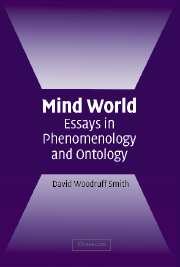Book contents
- Frontmatter
- Contents
- Prolegomena: The Terroir of Consciousness and the World
- Origins of the Essays
- Overview: A Story Line
- The Picture
- 1 Three Facets of Consciousness
- 2 The Cogito circa a.d. 2000
- 3 Return to Consciousness
- 4 Consciousness in Action
- 5 Background Ideas
- 6 Intentionality Naturalized?
- 7 Consciousness and Actuality
- 8 Basic Categories
- Coda: The Beetle in the Box
- Appendix: Background Conceptions of Ontology, Phenomenology, Philosophy of Mind, and Historical Philosophy
- Index
- References
2 - The Cogito circa a.d. 2000
Published online by Cambridge University Press: 05 June 2012
- Frontmatter
- Contents
- Prolegomena: The Terroir of Consciousness and the World
- Origins of the Essays
- Overview: A Story Line
- The Picture
- 1 Three Facets of Consciousness
- 2 The Cogito circa a.d. 2000
- 3 Return to Consciousness
- 4 Consciousness in Action
- 5 Background Ideas
- 6 Intentionality Naturalized?
- 7 Consciousness and Actuality
- 8 Basic Categories
- Coda: The Beetle in the Box
- Appendix: Background Conceptions of Ontology, Phenomenology, Philosophy of Mind, and Historical Philosophy
- Index
- References
Summary
Abstract. What are we to make of the cogito (cogito ergo sum) today, as the walls of Cartesian philosophy crumble around us? The enduring foundation of the cogito is consciousness. It is in virtue of a particular phenomenological structure that an experience is conscious rather than unconscious. Drawing on an analysis of that structure, the cogito is given a new explication that synthesizes phenomenological, epistemological, logical, and ontological elements. What, then, is the structure of conscious thinking on which the cogito draws? What kind of certainty does the experience of thinking give one about one's thinking and about one's existence? What form of inference is the cogito, and what is the source of its validity and soundness? Does the cogito itself lead to an ontology of mind and body like Descartes's dualism? The discussion begins with Descartes's own careful formulations of some of these issues. Then the cogito is parsed into several different principles, the phenomenological principle emerging as basic. In due course the analysis sifts through Husserl's epistemology, Hintikka's logic (or pragmatics) of the cogito, and Kaplan's logic of demonstratives, as these bear specifically on the cogito.
Segue. In “Three Facets of Consciousness” we proposed that the nature of any entity, including an act of consciousness, divides into form, appearance, and substrate. Here we explore the form of consciousness – that of self-aware intentionality – through its appearance within an act, that is, through “inner awareness.” We approach the analysis of inner awareness by a critical review of the traditional “cogito,” drawing on Descartes's analysis but from today's perspective (without dualism and without incorrigibility). […]
- Type
- Chapter
- Information
- Mind WorldEssays in Phenomenology and Ontology, pp. 42 - 75Publisher: Cambridge University PressPrint publication year: 2004
References
- 1
- Cited by



